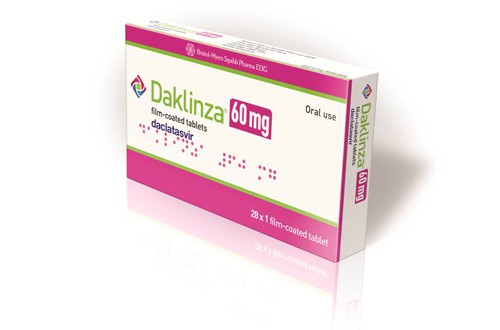
As World Hepatitis Day draws to a close, Bristol-Myers Squibb has hit back at NICE’s decision to restrict use of its new hepatitis C treatment Daklinza (daclatasvir) to a sub-population of patients.
In draft guidance released today, NICE has said that the NS5A replication complex inhibitor, in combination with other treatments, is recommended for HCV genotypes 1 and 4 who have significant fibrosis (liver scarring) without cirrhosis, if that patient has been previously treated with the injectable treatment interferon, or is ineligible or intolerant to interferon.
The European regulator last year approved Daklinza, in-line with Gilead’s blockbuster hep C pill Sovaldi (sofosbuvir), as an all-oral treatment that can be use in the four main strains of hepatitis C (genotypes 1, 2, 3, and 4).
It can also be used in patients with advanced liver disease and who have failed prior treatment with HCV protease inhibitors such as Merck & Co’s Victrelis (boceprevir) and Vertex’ Incivek (telaprevir).
But NICE has not recommended the use of Daklinza-based regimens to treat patients with genotype 3 of the disease – which accounts for around 45% of all cases in England, according to BMS.
Hepatitis C genotype 3 is also associated with faster disease progression (liver damage) and is more difficult to treat with oral regimens than other genotypes.
Johanna Mercier, general manager of Bristol-Myers Squibb UK & Ireland, said: “This is a disappointing decision by NICE, which contrasts with the assessments from other clinical and regulatory bodies across the UK, and does not provide equality of access across the UK.
“We will be working closely with NICE to see if a solution can be found, and hope that this decision can be urgently reassessed so that patients do not suffer as a result.”
NICE said that the drug for genotype 3 patients was not cost-effective. Without the cost of other treatments, Daklinza alone costs just over £8,100 for a 28 pack. The pill is taken once a day for between 12 and 24 weeks, meaning its total cost ranges between £24,400 and £48,700.
The average cost of Daklinza plus Sovaldi is £59,501 for a 12 week course and £119,002 for a 24 week course.
The decision comes just after World Hepatitis Day, which is designed to raise awareness of the disease to the public.
NICE ‘must review its decision’
Commenting on the guidance, Liz Carroll, CEO of the Haemophilia Society said: “This decision by NICE does not appear to be in the best interest of patients, particularly for those with genotype three. This is a difficult-to-treat subtype, with little other treatment options available, especially for those who have already undergone extensive treatment previously.
“Those who are living with serious liver damage need rapid, tolerable and effective treatment to prevent further progression of their disease. It is imperative that NICE reviews its stance on this regimen to avoid endangering very unwell people who are in real need of support.”
There are however NICE-approved treatments for HCV patients with genotype 3. In February NICE recommended Sovaldi, in combination with the injectable drugs ribavirin and peginterferon alfa, as an option for some patients with genotypes 1- 6 chronic hepatitis C.
And a month later NICE also recommended NHS funding for Gilead’s next-gen version of Sovaldi, Harvoni (ledipasvir-sofosbuvir), which can cure up to 99% of all patients in eight weeks, for treatment for genotypes 1 and 4.
It has not, however, recommended funding for genotype 3, saying that its use with the injectable drug ribavirin was not cost-effective.
There are injectable treatments for this genotype that are also NICE-approved, but have only around 50% cure rates, and much more adverse side effects.
Funding delays, growing sales
But while Sovaldi is now NICE-approved, the drug will not actually be paid for by the NHS until next month – an intentional and controversial delay designed to help the NHS save money.
The drug costs around £35,000 per patient (plus the cost of older injectable treatments), but can effectively cure around 95% of all late-stage patients with the disease in around 12 weeks.
This works out at a much lower cost than the £50,000-£70,000 it costs for a liver transplant in these patients, but NHS England has said that paying for Sovaldi upfront would need funding of £1bn – a ‘prohibitive cost’ according to NHS documents.
Harvoni costs slightly more than Sovaldi per patient (at £39,000, but does not always need to be used with injectable medicines), but NICE told PMLiVE that it had not been asked to delay funding for this drug as it had been with Sovaldi.
The two medicines have been performing well for Gilead, who released its financial results today. Sovaldi, which saw revenue of more than $10bn last year, made $2.26bn in the first six months of 2015.
This has slowed dramatically compared to the year-ago period, but this is because of the runaway success of Harvoni, which saw half-year sales of $7.18bn, putting it on course to beat AbbVie’s auto-inflammatory drug Humira (adalimumab) as the biggest-selling drug of 2015, and the fastest-selling medicine in history.
NHS ‘morally wrong’ to deny treatment
Meanwhile NHS England, which makes final decisions on treatments for hepatitis C, has been branded “morally wrong” by a sexual health charity The Terrence Higgins Trust this week for not allowing HCV patients to be cured until their illness has reached a chronic stage.
Both Sovaldi and Harvoni are reserved for patients at an advanced stage of the disease, and are only deemed cost-effective if they can stop the immediate need for a liver transplant.
Patients who are not as advanced cannot gain access to the drugs until they start to develop cirrhosis or cancer.
Dr Shaun Griffin, director of external affairs for the charity, told Sky News: “We think it’s morally wrong that people have to wait until the end-stage of their disease, getting more and more sick until this treatment becomes available.”




